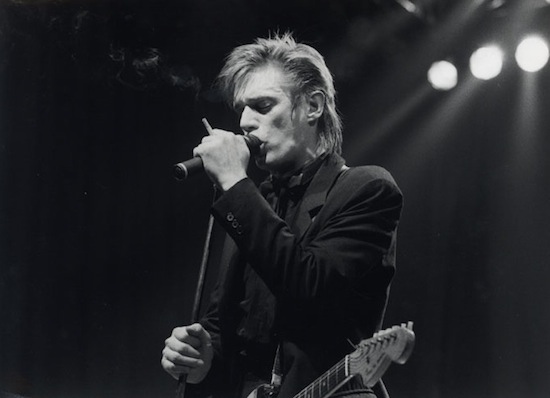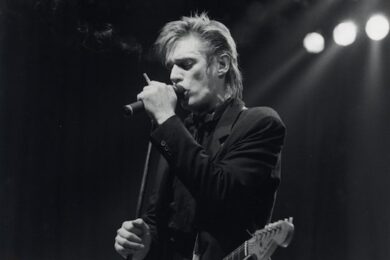There are many legendary bands who name is a shibboleth for a certain kind of taste or knowing insiderism, but whose recorded output is less adequately attended to than it deserves to be. High on that list of bands are avant-noise German collective Einstürzende Neubauten, a band from West Berlin born from the apocalyptic Cold War paranoia that gripped that city for decades, whose music is famous for the explosive din produced its unusual and repurposed instrumentation. Over their three and a half decades of operation this has included jackhammers, sheet metal and fire, an instrumentation perfectly suited to the broken terrain of a city smashed into submission and never properly rebuilt.
‘Schwarz’ (from the Kalte Sterne double 7", 1980)
There’s a particular reductive narrative about EN’s career, most common among nostalgia-soaked aging post-punks, according to which they used to be violent and loud and have gotten progressively tamer and safer over the years. ‘Schwarz’, from the 1980 double 7" Kalte Sterne clearly gives the lie to that story. One of EN’s earliest tracks, it shows that from the very beginning the band’s notorious explosions were balanced out by an intuitive mastery of negative sonic space and of hushed, breathless tension. Two simple synth bass notes form a droning bedrock for Andrew Unruh’s sparse, rhythmless clangs of metallic percussion and Blixa Bargeld’s mournful vocals, intoning and yowling by turns. This was also the first of Neubauten’s many love songs: "Hold me tight/I’ll hold you tight/I’ll never leave you again." Simple in structure and of remarkably focused intensity, ‘Schwarz’ is as adequate an introduction to the earliest work of Einstürzende Neubauten as any of their more aggressive initial efforts.
‘Steh Auf Berlin’ (from Kollaps, 1981)
Beginning with the sound of an electric drill, ‘Steh Auf Berlin’ contains all the elements the early Neubauten became notorious for: power tools, metal percussion, brute repetition, and screaming lyrics obsessed with decay, disease, and imminent destruction. It’s also an exemplary early instance of a later lyrical hallmark, Bargeld’s effortlessly multi-layered punning: the title "Steh auf Berlin" means "stand on top of Berlin" but also "I love Berlin" and, as an imperative, "Berlin, wake up!" Their music would soon grow considerably more nuanced and elaborate, but this song’s treble-heavy repetitive clang is a perfect document of the brash young band’s early sound.
‘Durstiges Tier’ (from the ‘Thirsy Animal’/’Durstiges Tier’ 12", 1982)
This is one of the most terrifying pieces of music you will ever hear. Depending on your reaction to that statement you’ll either skip this one or rush to press play as fast as you can. If the latter, I recommend making sure you’re alone in the dark to maximize the effect. A standout track in EN’s catalog, it’s not only one of their best and more bizarre numbers but also a sonic turning point, half-way between the teeth-grinding drill’n’metal of their debut and the complex, experimental soundscapes and would soon become their hallmark.
The A-side to this 12" features vocals from Lydia Lunch and guitar by Rowland S. Howard; it’s one of the only EN tracks to feature vocals from someone other than Bargeld and their first-ever track with vocals in a language other than German. But the A-side is merely the comparatively restrained prelude to the droning horror of the German language B, which doesn’t feature Lunch or Howard but which does feature the sound of raw meat and the muted thump of F.M. Einheit repeatedly punching Bargeld in the chest while he emits an inhuman, high-pitched squeak beneath ominous, muttered vocals. Gut-wrenching, stuttering bass, spine-shivering metal squeals, and maniacal laughter complete the nightmarish sonic tableau. You may love it or hate it, but you’ve never heard anything like it before.
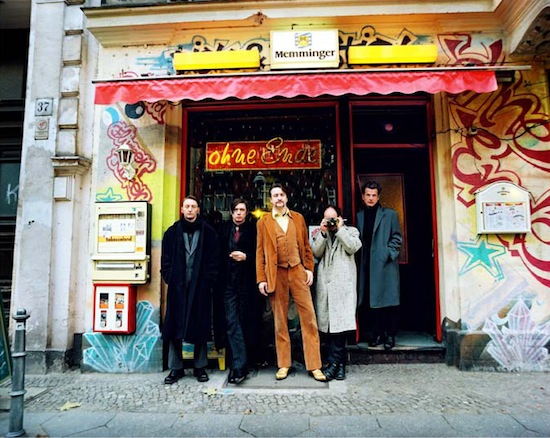
‘Zeichnungen Des Patienten O.T.’ (from Zeichnungen des Patienten O.T., 1983)
Formed spontaneously to fill stage time during a friend’s club night, with a name chosen as a joke and a reputation for being unlistenable, Neubauten would have surprised nobody by disappearing after one album. Instead they expanded their lineup and hunkered down in Berlin’s Hansa Tonstudio, where Bowie had recorded Heroes, to transform their droning, atonal thump into a systematic challenge to the very nature of recorded sound. The repetitive percussion, power drills, and apocalyptic mantras of Neubauten’s first album did nothing to prepare anyone for the massive leap forward their sound would take on their second album, released two years later. 32 years after its release Zeichnungen sounds as new, as bold, and as disturbing as any record in recent memory, by turns fiery and chilling, it’s a relentlessly exploratory masterpiece of Cold War European decay.
Amidst the many bizarre experiments the album holds, the title track features what for Neubauten must be considered a genuine innovation – it’s the first EN song with a clearly recognizable verse/chorus structure. Other tracks on Zeichnungen include field recordings of disturbed children, the sound of fire, cannibalized snippets of Armenian folk melody, and humming electricity; here the track is built around a hand-crafted loop of shattering glass and Marc Chung’s trademark machine-gun basswork, over which Bargeld howls out a dystopian vision of "a new sun, which burns more than it illuminates" and Barraud’s dog listening for His Master’s Voice not next to a record player but next to a tombstone.
‘Sand" (from Halber Mensch, 1985)
On Zeichungen, amid relentless experimentation and literally explosive energy, Neubauten began displaying the first hints of melody and conventional song structure. By their third album, Halber Mensch, a favorite among both fans and critics, they had begun to exhaust the range of materials and the techniques with which to record and loop them, and focused more intently on the arrangement and structure of the songs. This can be heard on the choral call and response of the title track and the frankly queasy silences that punctuate the incendiary howls of ‘Seele Brennt’. But Halber Mensch also shows the first clear evidence of a quality essential to Neubauten’s spirit but often critically overlooked: their sense of humour, revealed on the mock drinking song ‘Trinklied’, on the bouncing coke-binge anthem ‘Yü-Gung’, and on their first-ever proper cover version, Nancy Sinatra and Lee Hazelwood’s ‘Sand’, stripped back to little more than a stomp and a strum and with Bargeld singing both parts. "We detected a Neubautenish feel to the original," Bargeld told an interviewer at the time, and indeed, for a band practically synonymous with the po-faced German avant-garde, there’s a surprisingly deep strain of bluesy Americana in their work. This is most clearly apparent in their cover versions, whether ‘Sand’, Tim Rose’s ‘Morning Dew’, or, most recently, Pete Seeger’s ‘Where Have All the Flowers Gone?’ (albeit in the German version made famous by Marlene Dietrich). Originally released on a bonus 10" accompanying the first pressing of the eight-track album, ‘Sand’, along with the 10-minute instrumental noise fest ‘Das Schaben’ ("the scraping") became part of the album proper on its CD reissue.
‘Zerstörte Zelle’ (from Fünf Auf Der Nach Oben Offenen Richterska, 1987)
‘Adler Kommt Später’ (from the Smack My Crack compilation, 1985)
As an album, Fünf Auf Der Nach Oben Offenen Richterskala, EN’s fourth LP, is a patchwork affair, cobbled together from various studio sessions and reworked tracks, including ‘Kein Bestandteil Sein’, the earliest version of which appears on an ultra-low-fi cassette tape recorded by Bargeld and Unruh in 1980. But among its individual tracks are some of the most powerful moments in Neubauten’s catalogue, and ‘Zerstörte Zelle’ ("Destroyed Cell") the epic eight minute opening track, is worth the price of admission all by itself.
If Neubauten’s second and third albums saw them move from clanging repetition towards verse/chorus song structures; ‘Zerstörte Zelle’ marks the next phase in their development, from "songs" to complex, sectional compositions. It’s their first track to include strings, an increasingly regular feature in later years. And like ‘Kein Bestandteil Sein’, it’s something of a recycled number: a protean demo of the song (from the Halber Mensch sessions) was included on the Giorno Poetry Systems’ Smack My Crack compilation in 1985 under the title ‘Adler Kommt Später’. The development that the song undergoes between that 1985 demo and the finished 1987 recording is astounding.
The song begins with a lurching three note bassline that feels like an earthquake in your guts, and a hushed, terse vocal, interspersed with a slithering metallic rattle (N.U. Unruh playing a shopping cart with a contact mic attached to it). The lyrics pull together several of Bargeld’s favorite themes, including corporeal decay, mythological symbolism, and political nihilism, into a multi-layered set of punning metaphors in which the collapse of the body’s cells represents as a willful refusal to feed the prison cell of the Cold War German state. The track crawls forward with terrifying menace, and just as the tension builds to a spine-tingling, horror-movie level, a string section swoops down in a dramatic crescendo before abruptly disappearing and leaving the listener in a vacuum of paranoid silence that slowly builds again to a thundering finale, Bargeld’s whispers growing into his signature piercing scream as the strings are joined by the brute pounding force of F.M. Einheit’s drums. The track’s tense paranoia creeps towards its epic finale in an incredible, almost unbearable buildup before vanishing, suddenly, shockingly. This eight minute emotional rollercoaster is Neubauten at the peak of their powers.
‘Fiat Lux Trilogy’ (from Haus Der Lüge, 1989)
If ‘Zerstörte Zelle’ was the first of Neubauten’s elaborate sectional compositions, it was hardly the last. Their tracks would grow increasingly long and complex from album to album. As a friend once pointed out to me back in the days when fans would trade bootlegs in hard copy, you can fit two of Neubauten’s live shows from the early 80s on a single 90-minute cassette, but by the early 90s you need one-and-half cassettes per show.
The Fiat Lux Trilogy on 1989’s Haus Der Lüge is a 12-minute epic in three distinct parts. The seeds of the composition lie in a site-specific performance EN did in a Fiat factory in northern Italy in the late 80s. The first part the trilogy, also titled ‘Fiat Lux’, is one of the delicate pieces of music Neubauten have ever recorded. It’s largely a Bargeld solo piece, built mostly out of guitar and vocal. In the later 80s Bargeld’s guitar-playing shifted from a discordant, fractured strum (showcased on early Nick Cave & the Bad Seeds albums) to a signature technique relying almost entirely on the left hand with no plucking or strumming, in which an open tuning and a steel slide combine to produce a shimmering ethereal hum (see for example Cave’s ‘Stranger Than Kindness’, co-authored by Bargeld and Anita Lane). That open, shimmering guitar is at the heart of ‘Fiat Lux’, drenched in reverb and overlaid with a haunting vocal singing the most straight-forward love song Neubauten had written to that point. "When you come you’ll come with light/you’ll come radiant/to open my hidden places/scatter my shadows/and read me out loud." In the album’s liner notes, the critic Biba Kopf describes the track perfectly as "a cathedral of sound."
‘Fiat Lux’ slowly gives way to ‘Maifestspiele’, a long instrumental passage in which the same guitar is overlaid with the sound of buzzing bees and field recordings of a May 1st riot in the Berlin neighbourhood of Kreuzberg, a traditional hotbed of leftist political unrest. The final section of the trilogy is the gasping, chugging motorik of ‘Hirnlego’ ("Brain Lego"), another example of Neubauten’s meticulous studio work. "What’s that growing out of my tree? Uh, I mean, out of my brain" Bargeld asks in mock confusion, one of his frequent lyrical references to altered states of mind and hallucinatory delirium. The final section sits somewhat oddly alongside the first two, but by its end the trilogy has displayed more sonic experimentation, technical acumen, and a more complex emotional arc in 12 minutes than most bands manage to fit into an entire album (or in some cases an entire career).
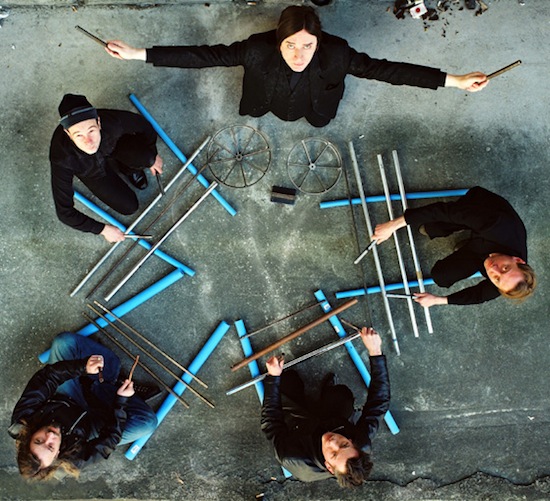
‘Headcleaner’ (from Tabula Rasa, 1993)
The Fiat Lux trilogy is a sectional composition that showcases Neubauten’s capacity for beauty, subtlety, and harmony, as well as their underappreciated skill at studio wizardry in its loopy, loping third section. ‘Headcleaner’, a 15-minute epic from 1992’s Tabula Rasa, is in a sense its inverse, showcasing the band at their loudest, brute pummeling fury, though not without intermittent quiet passages that merely heighten the explosive force when the loud parts resume. ‘Headcleaner’, a fan favourite and for years a set-closing live staple, is a catalog of everything the band have learned about making noise in the decade preceding its release: sheet-metal drums, screams, mechanical, percussive bass, shrieking e-bowed guitars, and, in one section, a ringing extended drone at a frankly painful frequency. Though never overtly political in an activist sense, there has always been an anti-fascist bent to EN’s ethos and to Bargeld’s lyrics, and here that bent is put front and center in wryly satirical lyrics describing, without naming names, the assembly and forward march of a gristly parade of brain-washed horrors.
‘Headcleaner’ was composed for a site-specific performance directed by Erich Wunder in Vienna in 1992, during which Neubauten performed live aboard a phallus-shaped vehicle that drove them through Vienna’s Ringstrasse. The original 45-minute piece was cut down into just over a quarter of an hour for its studio version, though none of its bludgeoning force has been lost in the editing process. Rounding out the shrieking frenzy is a bell machine constructed by resident craftsman Andrew Unruh, ironic references to the Beatles’ ‘All You Need Is Love’, and a surprising, hushed final section in which Bargeld’s strangled vocals quietly quote Pliny’s description of Vesuvius consuming Pompeii while the guitar and bass play a gentle accompaniment entirely built out of harmonics. The monstrous, pounding journey concludes with a trill of birdsong, leaving the drained listener feeling distinctly bulldozed. It’s apt that Tabula Rasa should end with a summary of all the techniques EN had accumulated to that point, because the sessions for their seventh album would bring great changes and a new era for the band.
‘Installation No. 1’ (from Ende Neu, 1997)
‘Installation No. 1’ (live in Berlin, 2000)
Neubauten’s seventh studio album, Ende Neu, is, like 1987’s Richterskala, a patchwork affair. Before recording sessions began, longtime bassist Marc Chung announced his departure from the band. Halfway through the sessions, with just a few tracks sketched out, percussion stalwart F.M. Einheit left due to creative differences about the direction the album was taking. The band very nearly broke up permanently in the wake of these personnel changes, before deciding to regroup, complete the album, and recruit two new members.
‘Installation No. 1’ is the fourth track from Ende Neu, and these two versions highlight many of the shifts in the band’s style between those fractious recording sessions and the reformed group that emerged from them. The album version, with its strict, unvarying rhythm, bears Einheit’s techno-obsessed stamp all over it. Three years later, in a video from EN’s 20th-anniversary concert, the reconfigured band perform an extended live version that is looser, more dynamic and playful, but at the same time more intense and furious. With the stark aphoristic brilliance of a Nietzsche or a Burroughs, Bargeld’s lyrics consist entirely of four English words that produce an impossibly self-contradicting axiomatic imperative: "Disobey – it’s a law."
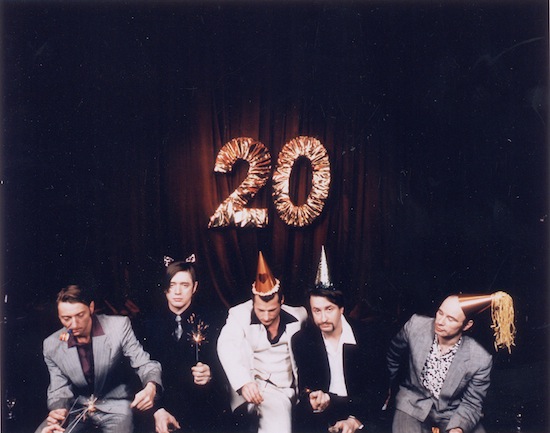
Einsturzende Neubauten at 20
‘Sonnenbarke’ (from Silence Is Sexy, 2000)
The revamped line-up in the wake of Ende Neu‘s recording was not merely cosmetic; it marked a significant stylistic shift in the band. F.M. Einheit’s relentless 4/4 pounding was replaced by the more subtle, electronics-tinged rhythms of Rudolf Moser, formerly of Die Haut. Marc Chung’s machine-like, percussive bass sound, informed by his time in Hamburg punk band Abwärts, was replaced by the melodic, bluesy basswork of Alexander Hacke, formerly Neubauten’s guitar player (guitar duties were taken over by Jochen Arbeit, also of Die Haut). ‘Sonnenbarke’ showcases both of these new features: evoking the ancient Egyptian story of the sun god Ra’s boat which drives the sun through the heavens and the underworld (as retold in Ovid’s Metamorphoses), the slow, elegant bassline pushes the song along gently under a rapid, odd percussive sound produced by nothing less unusual than a jet turbine. This was stripped of its casing and played with drum sticks as it rotated. An earlier Neubauten track that started this slowly might well have been expected to erupt at some point, but in ‘Sonnenbarke’ careful pacing simply builds and builds with no radical break, rising to a masterful, multi-tracked crescendo after nearly eight minutes of slow, controlled simmer.
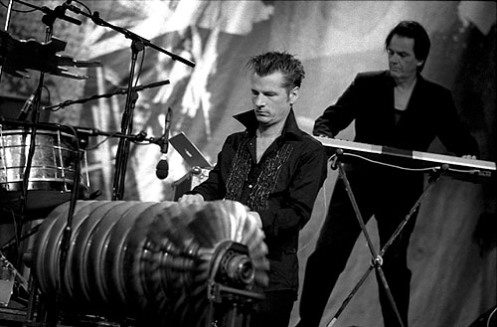
Jet turbine percussion. Photo by Valerio Berdini
‘Compressors In The Dark’ (from Supporter Album #1, 2003)
‘Ich Gehe Jetzt’ (from Perpetuum Mobile, 2004)
‘Good Morning Everybody’ (from Grundstueck, 2005)
Like many radically experimental bands with firm aesthetic commitments, Neubauten have never had a comfortable relationship with the business and commercial sides of music-making; this unease has been reflected in the lyrical cynicism of songs like ‘Die Genaue Zeit’ (1983) and ‘Prolog’ (1989). Their labourious process and idiosyncratic recording needs made the studio time for their early albums exorbitantly expensive and their work is difficult to market. Their enormous arsenal of custom-built equipment makes touring a hassle at best and a logistical, financially ill-advised nightmare at worst (notwithstanding the fact that their live shows are life-changing musical experiences). The complexities inherent to their work were compounded by the fact that, for the decade that spanned their second through fifth studio albums, they were signed to British label Some Bizarre, a notorious enterprise either maniacally quirky or downright criminal, depending who you ask. Like their labelmates Coil and Soft Cell, this led to a carelessly mismanaged back-catalogue, missing royalties and long years during which their albums were difficult to find without paying ridiculous prices.
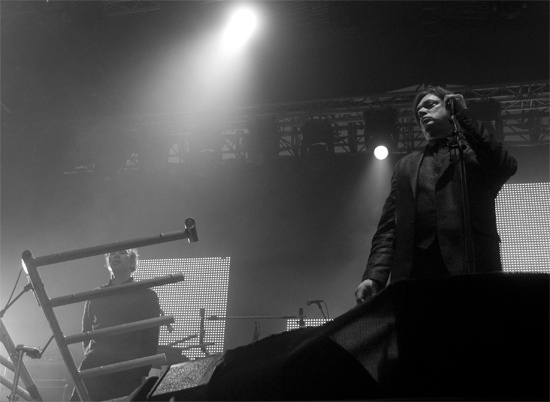
Photo by Hayley Hatton
Though their second decade saw them begin a more productive and reliable collaboration with Mute Records, by the beginning of the 20th century Neubauten were fed up with the machinations of the industry and decided to assert vertical control of their entire operation by buying their own studio, paying for their own sessions, and selling their music themselves through the internet. This may seem like a self-evident approach in the age of Kickstarter, but it’s hard to overstate how bold and forward-thinking this decision was in 2002, when it was first announced. Through their website neubauten.org, EN sold membership packages to finance their next album in advance. Supporters would receive the recorded output, and, just as importantly, the recording sessions were streamed live over the internet and the band, both during recording and in frequent chat sessions, would welcome supporters’ input about the progress of the album.
As with any genuinely forward-thinking artists, a good number of Neubauten’s experiments end up on the cutting room floor. One such experiment was a recording session during which the band fooled around with a crude pipe organ constructed by Andrew Unruh out of plastic pipes played with air compressors. Deciding the track was going nowhere, the band decided to leave it, only to have supporters demand they keep working on it. The result was ‘Compressors In The Dark’, which appeared on Supporter Album #1, availably exclusively to supporters. Here Bargeld’s terse, staccato lyrics, composed entirely of monosyllabic words, are opposed to the slow, elongated hiss of the air compressors, underlaid by the heavy bass thump of a car spring played with a drum stick. When they returned to the studio to produce 2004’s commercially-released Perpetuum Mobile, they revisited the song, and, with a tighter arrangement and mostly new lyrics, recreated it as ‘Ich Gehe Jetzt’, another testament to the organic way the band’s material evolves over time and their willingness to revisit it.
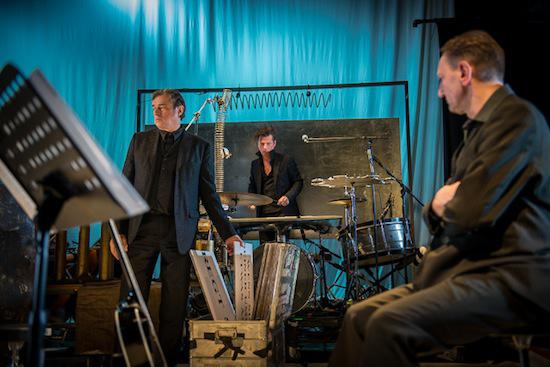
Photo by Valerio Berdini
Their intrepid, problem-solving approach was further showcased by the tour that followed Perpetuum Mobile. Most shows on the tour opened with ‘Ich Gehe Jetzt’, draining the air compressors in the process. However, the compressors were needed for at least two other tracks that were regularly performed live on that tour (‘Ende Neu’ and ‘Ozean Und Brandung’). Recharging the compressors, though, was a rumbling 97-decible-loud affair. The band’s solution was to compose a new song around the sound of recharging air compressors: the result was ‘Good Morning Everybody’, a live staple in 2004 and 2005, a studio version of which appeared on EN’s second supporter-only album, 2005’s Grundstueck.
‘Susej’ (from Alles Wieder Offen, 2007)
The third and final supporter-backed album was 2007’s Alles Wieder Offen, a somber and introspective affair even by Neubauten standards. The crowning jewel of the album is the second-to-last song, ‘Susej’ (read it backwards). The core of the track is a then-27-year-old tape of Bargeld playing the guitar in EN’s early secret rehearsal space, dug up from the archives and turned into a chunky rhythmic loop over which are laid dark, churning percussion and glistening strings that grow slowly over the course of the song from a low simmer to a glorious orchestral crescendo. The lyrics, meanwhile, are a tour-de-force of blunt soul searching that nonetheless avoid any hint of confessional cliché. "The new me confronting the old me, and the old me confronting the young me" was how Bargeld prefaced the song live. The result is nothing short of stunning, one of the most beautiful tracks in a rich and powerful catalogue and a song without which no "Best of Einstürzende Neubauten" list could possibly be complete.
Einstürzende Neubauten play Primavera Barcelona and Porto over the next two weekends. Find out more about the Festivals here

